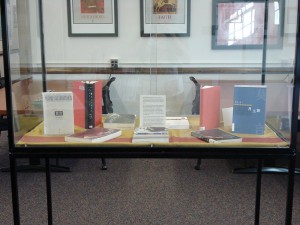Literary history holds many examples of writers who were formerly soldiers — Norman Mailer, Ernest Hemingway, Tim O’Brian, Stephen Crane, and T. E. Lawrence to name a few, but few of them can ever hope to be called such things as “[…] famous, oft-banned and widely pirated […] (Feb 15, 2005. Donald Morrison, “Holding Up Half the Sky”, Time Magazine, read more) Even fewer of these soldiers ever become Nobel Prize winners.
Mo Yan (莫言), a pen name, meaning “don’t speak,” for Guan Moye (管谟业), is the first resident of mainland China to be awarded the Nobel prize in Literature. He was a solider in the People’s Liberation Army after the Cultural Revolution. The only two other Chinese recipients of Nobel prizes are Liu Xiaobo (2010 Nobel Prize for Peace), who is currently imprisoned, and Gao Xingjian (2000 Nobel Prize for Literature), who gave up his Chinese citizenship in 1996. (Oct 16, 2012. Benjamin Carlson, “China Scrambles to Censor Discussion of Mo Yan”, Salon. Read more)
Mo Yan and his works have a complicated relationship with the Chinese government. While his books are often interpreted as critical of the government, he is a Chinese Communist Party member and the vice-chairman of the party’s Writers’ Association. He has been criticized for his compliance with the government, but some have argued that by his doing so, his books have been able to reach more people. (Oct 16, 2012. Benjamin Carlson, “China Scrambles to Censor Discussion of Mo Yan”, Salon. Read more)
Mo Yan is reportedly currently avoiding the media and working on his next book. (Oct 11, 2012. Sui-Lee Wee. “China’s Mo Yan feeds off suffering to win Nobel literature prize”, Reuters. Read more.)
The UIUC collection holds many of Mo Yan’s works, both in the original Chinese and in English translations. The International and Area Studies Library has pulled a selection of his titles for display, and they are available for checkout. You can also view his works available in our online catalog.
Those wishing to learn more about Mo Yan and his work should come visit the IAS and check out our display and selection of his titles, and also check out these suggested library resources:
Interviews and Articles:
- Telephone interview with Mo Yan after the announcement of him winning the Nobel Prize in Literature (interview in Mandarin Chinese, with English transcription)
- Mo Yan and the Rise of Male-Oriented Chinese Literature by Mei Fong. Oct 15, 2012. The Atlantic.
Literary Criticism and Interpretation
- Qiao, Guoqiang. 2008. “The Narrative Strategy of Chinese Avant-Garde Novels: The Case of Mo Yan.” Semiotica: Journal Of The International Association For Semiotic Studies/Revue De L’association Internationale De Sémiotique 170, no. 1-4: 211-220. Read full text online: UIUC Login Required.
- Chuanbo, Huang. “On Mo Yan’s War Ideas — Based on Red Sorghum, Big Breasts and Wide Hips.” Asian Social Science 6, no. 5 (May 2010): 153-156. Read full text online: UIUC Login Required.
- Liu, Hongtao, and Haiyan Lee. “Mo Yan’s Fiction and the Chinese Nativist Literary Tradition.” World Literature Today 83, no. 4 (July 2009): 30-31. Read full text online: UIUC Login Required.
- Huang, Alexander C. Y. “Mo Yan as Humorist.” World Literature Today 83, no. 4 (July 2009): 32-35. Read full text online: UIUC Login Required.


